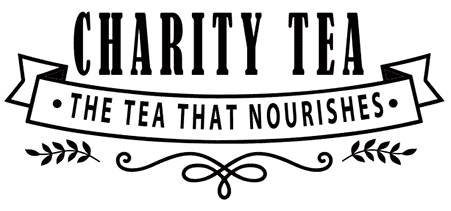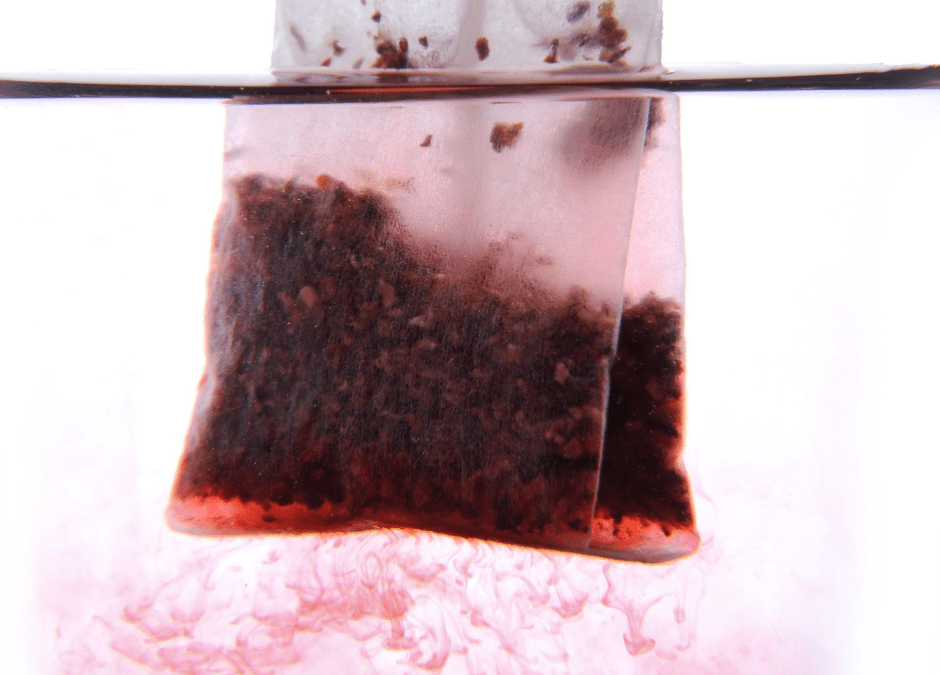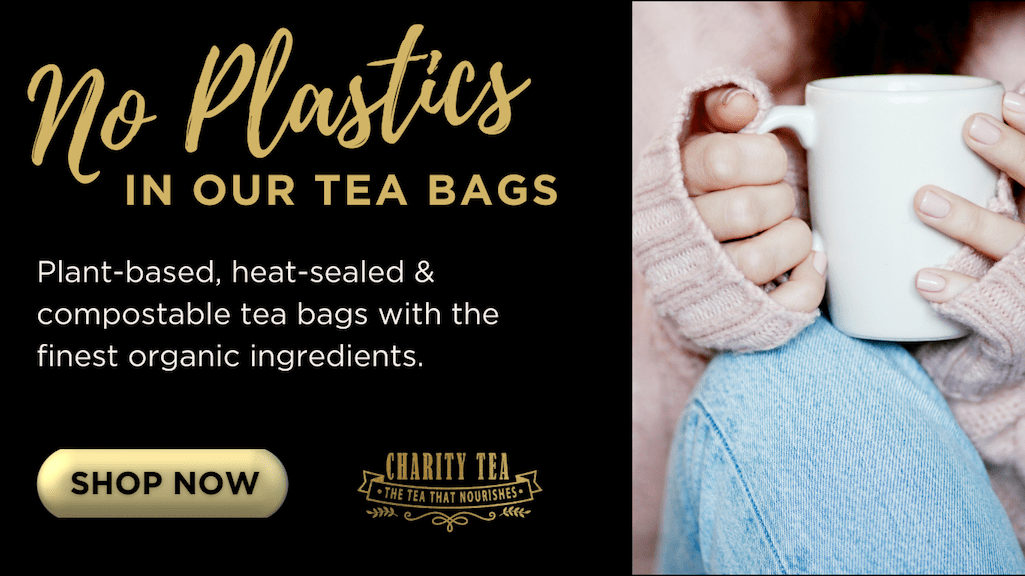Do you know exactly what is in your cup of tea? Recent research has revealed alarming statistics on how microplastics can be found in some of world’s favourite beverages, deposited through the tea bags themselves. Instead of letting this startling news put you off your cuppa, help is at hand by switching to plastic-free tea bags.
Find out the real health concerns on using tea bags that contain synthetic materials and the many benefits of moving to a healthier brew.
The hidden dangers of plastic in tea bags
It was McGill University in Canada that brought the shocking news about plastics in tea bags to the forefront of consumer consciousness.
Published in The Environmental Science & Technology Journal in 2019, the study reported that brewing a standard tea bag that contains plastics at 95ºC releases an alarming 11.6 billion microplastics and 3.1 billion nanoplastics into a single cup.
Let’s allow those figures to sink in. That’s a combined total of 14.7 billion microplastics and nanoplastics in a single cup of tea.
It’s mind boggling to think of how many of these tiny plastic particles are consumed over the course of a day, week, month or year – and especially for those of us who choose drinking tea to help support our health and wellbeing.
So what is the estimated damage of ingesting this unfathomable amount of microplastics?
Researchers on the study carried out an initial toxicity test on invertebrates revealing that behavioural and developmental changes came about when they were exposed to these tiny particles from the tea bags.
The true impact of these micoplastics is unknown. More research is certainly needed to determine the true impact on our health of plastic tea bags.
Fortunately times are changing. The awareness about microplastics in tea bags has spread across the globe and many consumers have responded by demonstrating the power in their dollars by choosing brands that offer plastic-free bags.
Read on to find out how to choose a healthy tea bags without mircoplastics. We also cover the importance of being aware of how your tea bags have been sealed, plus why you should choose tagless bags for your health and the environment.
Why do some tea bags contain plastics?
Plastics in tea bags can either come from the filter bags themselves or the glue that’s used to seal the bags.
Is your tea bag paper or plastic?
Many standard tea bags are made with a mixture of nylon, a silk-like thermoplastic, and polyethylene terephthalate or PET, a chemical compound that belongs to the polyester family.
Both nylon and PET materials are petroleum-based synthetic materials. Using infrared and X-ray technology, the researchers at McGill University discovered that tea bags made from these materials would cause billions of microscopic plastics to escape into the final consumed beverage.
Many tea manufacturers choose a mixture of nylon and PET materials to allow tea bags to be brewed without any breakages. Over the last couple of decades, new and inventive tea bag designs – like pyramids and circular bags – have also been released with claims of making a better-tasting brew.
If there are no words of warning on the packaging, it can be difficult to tell from first sight whether your tea bag is made from plastic materials or not.
The easiest way for some indication is the ‘tear test’.
If you can easily tear the bag, it is likely to be made from natural fibres.
If you’re unable to tear it, it’s likely to be made from plastic-based materials.
And if you love the feel and luxury of silk tea bags, be warned. It’s very likely these bags are made from plastic fibres rather than pure silk.
We recommend always checking with the tea manufacter directly if you’re concerned about the materials in their bags. Read on to find out what is used in Charity Tea’s organic tea bags.
How has the tea bag been sealed?
Another key factor in determining whether tea bags are plastic free is how the bags have been sealed.
Tea bags can be sealed in a number of ways, including:
- Glue sealed tea bags
- Heat sealed tea bags
- Stapled tea bags or those sewn with cotton
Glue sealed tea bags are the bags to stay clear from. According to SGS, a small amount of non-biodegradable polypropylene is used to seal each tea bag. In addition to the tea bag, this plastic-based glue means that roughly 25% of these types of tea bags are plastic-based.
As an alternative to glue, tea bags can be sealed by applying extreme heat to the edges of the bag. Many tea bags that use this type of sealing method are made with plant-based materials and polylactic acid (PLA).
Stapled or sewn tea bags do not use any glue or the heat sealing method, but other risks are associated with them.
Choose tea bags without staples
Staples are made from galvanised iron, which is iron with a zinc coating to prevent the metal from corroding. The staple itself is non-toxic on the tea bag, but there is a risk of the zinc compound becoming soluble when steeped in hot water, releasing zinc particles.
With stapled tea bags there is also the risk of swallowing the staple itself. Though a relatively rare occurence, if swallowed the metal cannot be digested and can harm the internal lining of the stomach.
Remove tea-bag tags as a precaution
They may look fancy during brew time, but tea bags with tags hold other risks to your health.
Aside from the unnecessary packaging associated with using tagged tea bags, it can be quite common for the tag to accidentally fall into your cup. This may seem like a small thing at the time, but many of these tags are printed on plastic coated paper and most use toxic – rather than plant-based – inks.
So unless you know the materials and inks used for those tags, it’s best to remove them completely before steeping the bag.
Switch to plastic-free tea bags
The good news is there are simple things you can do to make sure your beverage choices are not adversely affecting yours or your family’s health.
Here at Charity Tea NZ, we believe that a good cup of tea should not cost the earth, your health or the planet. Along with donating a portion of every sale to feed children living below the poverty line, we prioritise the things that matter so you are safe in the knowledge that your cuppa is a healthy choice.
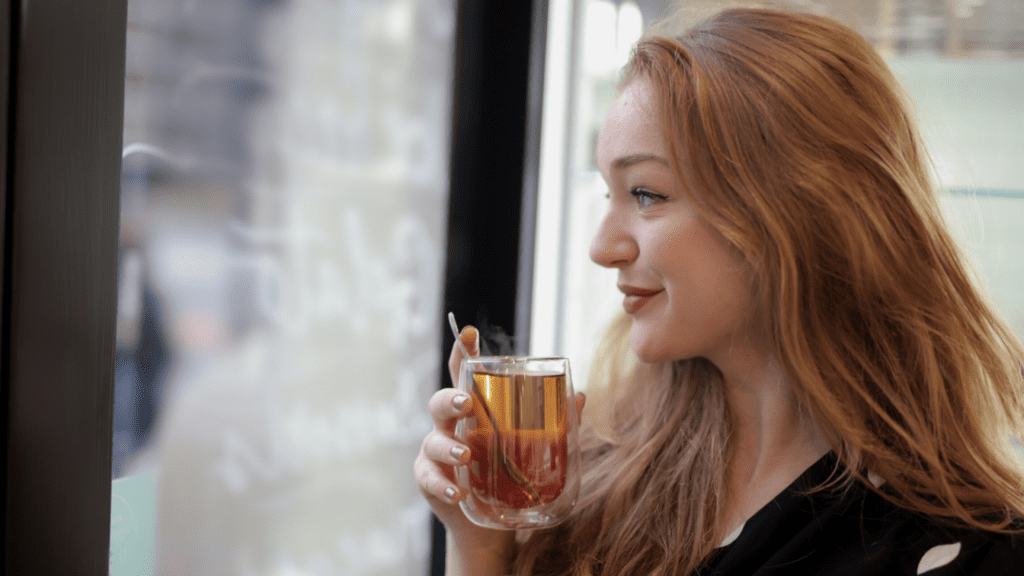
Choosing plastic-free tea bags is the healthier option
Finest organic teas, tested for purity
At Charity Tea, we source the finest quality ingredients from organic growers and, whenever possible, choose tea blends grown on homesoil here in New Zealand. Our teas are externally tested for purity.
Each of our blends, from breakfast tea, roobios and earl grey through to all of the healthy herbal varieties, are either Certified Organic or organically grown. They contain no sweeteners, colours or preservatives – they only have space for great-tasting tea leaves and herbs.
As a Certified B-Corporation and EKOS Climate Positive company, we source our teas from growers offering fair wages and work conditions.
Plant-based tea bags without microplastics
Every Charity Tea bag is free from plastics and does not contain dyes, glues, staples or tags.
The tea bags are made from plastic-free PLA material that is biodegradable. We use a heat-sealing method to seal the pouches, one which utilises extreme heat rather than glue.
Sustainable choices that are better for the environment
As a social enterprise business helping to change communities for the better, we want to have a positive impact on the health of our customers and the planet.
We’re commited to using biodegradable, compostable, refillable and recyclable packaging. During 2019 alone, we prevented over 10,000 plastic bags from going to landfill by choosing to instead wrap our tins in tissue paper.
Opt for loose leaf for even less packaging
If you’re still concerned about using tea bags, there’s a simple answer. Switch to loose leaf!
Loose leaf tea is better for the planet (no unnecessary packaging) and better for your pocket. Whether you prefer to brew in a pot or by the cup, you’ll get more tea for your money when you opt for a loose-leaf variety.
You may love the convenience of tea bags. But switching to loose leaf tea has other benefits other than price. When it comes to taste, loose leaf tea allows you to brew a cuppa that is exactly to your liking – whether that’s super-strong or with a hint of flavour.
Loose-leaf tea strainers and infusers are much more functional than they used to be. Quality tea infusers are made with stainless steel and feature tiny mesh holes so the tea leaves do not seep into your drink. They’re quick and easy to clean and reuse.
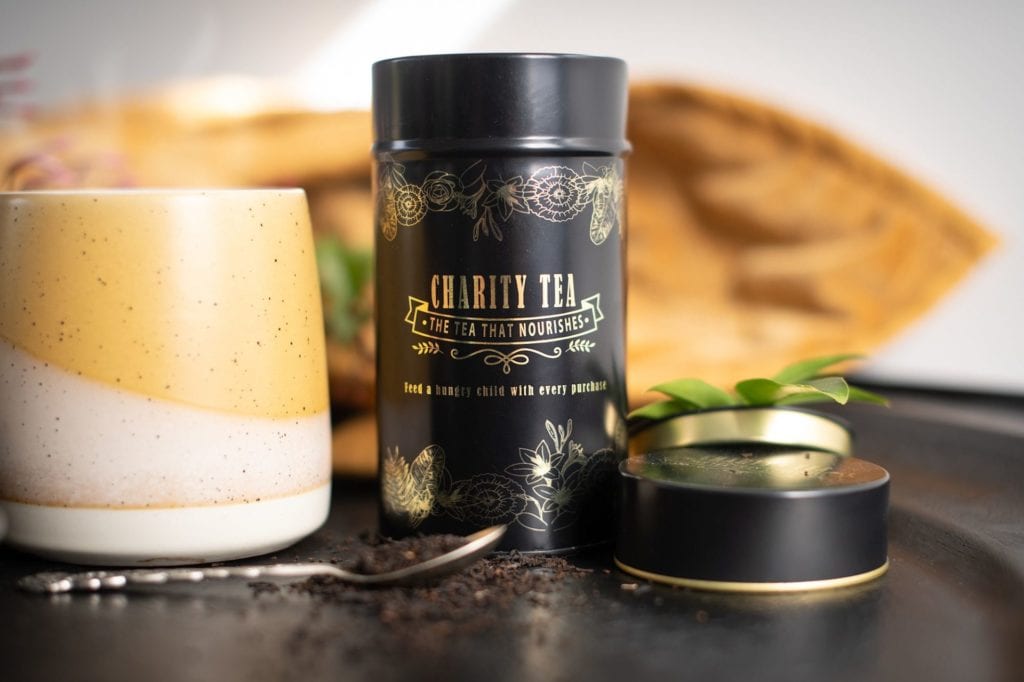
Organic Charity Tea comes in a variety of delicious blends, as a loose leaf or in plastic-free tea bags
